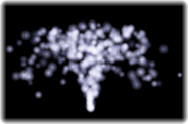Particles: Difference between revisions
Jump to navigation
Jump to search
No edit summary |
No edit summary |
||
| Line 25: | Line 25: | ||
* [[Particle Rendering|Rendering]] | * [[Particle Rendering|Rendering]] | ||
** [[Particle Rendering#Type of particle|Type of particle]] | |||
** [[Particle Rendering#Texture of particle|Texture of particle]] | |||
** [[Particle Rendering#Partition|Partition]] | |||
** [[Particle Rendering#Tile-blending|Tile-blending]] | |||
** [[Particle Rendering#Modus of Drawing|Modus of Drawing]] | |||
** [[Particle Rendering#Export/Import|Export/Import]] | |||
* [[Particle Emitter|Emitter]] | * [[Particle Emitter|Emitter]] | ||
Revision as of 22:15, 25 March 2006
The particle-systems offer you phantastic possibilities in the range of the "special effects" The basic set of parameters like direction, speed, largeness and color of the particles allow indefinitely many possible combinations for "open on ideas "designer. You can use particles as a foreground or (in the near future) for object-graphics or animations, which can be placed anywhere in your game-rooms/scenery.
Examples for possible applications:
- Weather effects(rain, fog, snow,...)
- Fire (flames, sparks,...)
- Water (fountain, waterfall,...)
- Plasma, force field, laser,...
There are lots of possibilities!
- Handling of the input field for numbers with decimal places
- Handling of the input field for colors
- The RYB-range of colours and the HSV-range of colours
- Handling of the input field for curves

